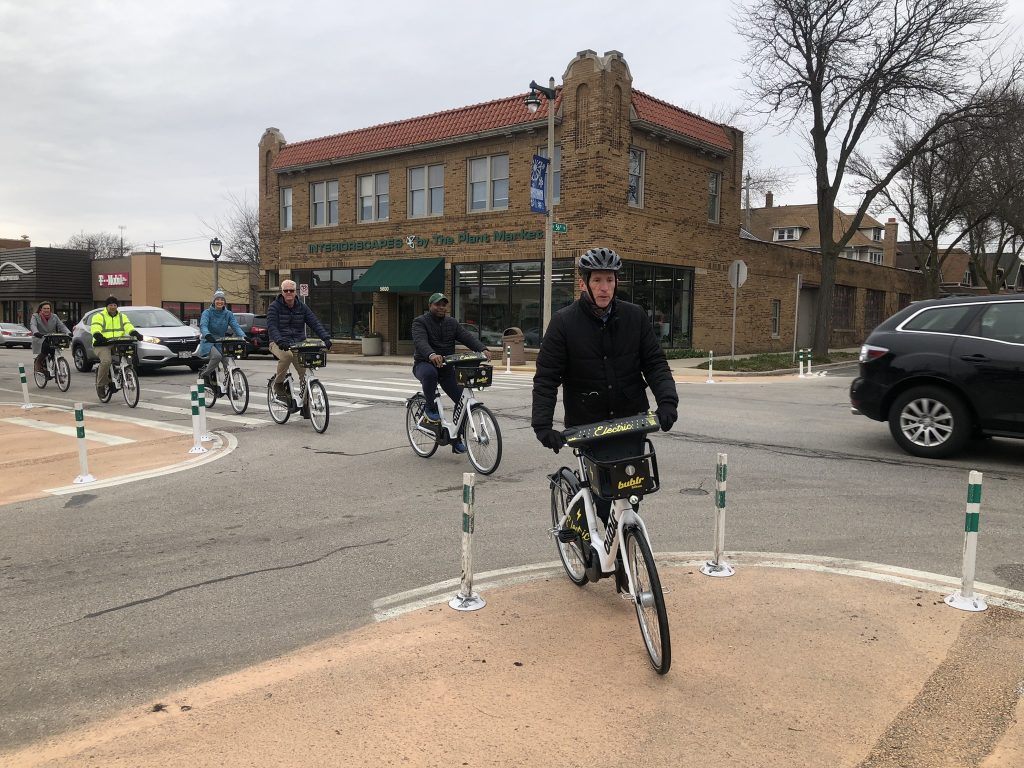Do E-Bike Speeds Need To Be Regulated?
All the city news you can use.

Wauwatosa Mayor Dennis McBride, followed by Milwaukee Mayor Cavalier Johnson, ride new Bublr e-bikes. Photo by Jeramey Jannene.
Every day at The Overhead Wire we sort through over 1,500 news items about cities and share the best ones with our email list. Each week, we take some of the most popular stories and share them with Urban Milwaukee readers. They are national (or international) links, sometimes entertaining and sometimes absurd, but hopefully useful.
100-year anniversary of killing the walk: Historian Peter Norton shared the anniversary for when everything in transportation changed away from walking, biking and transit to car centric rules in regulations in the city of LA. On January 24th 1925 (literally 100 years from the day this link list is being published here) Los Angeles introduced a law which gave motorists priority on city streets. That law became a model for the rest of the country and our cities can trace their autocentricity back to that fateful day. (Peter Norton | Streetsblog USA)
Rethinking e-bike regulations: New York State wants to regulate “Class 3” e-bikes, which can go up to 28 miles per hour, to treat them like mopeds, which require a license and registration. But part of the problem with regulations generally is that there are too many classes and bikes all look similar. In Europe there are just two levels of bikes, the ones that go over 15 mph and those that go under 15 mph. Standard levels and rules would go a long way toward making regulation, enforcement and safety easier. (Lloyd Alter | Carbon Upfront!)
A web of governance weak by design: In contrast with East Coast cities with strong mayor systems, the Los Angeles region as a whole is a web of 88 cities in one large county of over 10 million people. The lack of a central leader seemed to be a conscious choice to avoid the machine systems that dominated East Coast cities. A new county executive will be first elected in 2028. But the current disconnection was made apparent during the fires that have engulfed different parts of the county in and out of Los Angeles proper. (Adam Nagourney | New York Times)
Is small thinking the new American way?: A new National Bureau of Economic Research paper questions why housing construction productivity has lagged while productivity in so many other industries have improved immensely. From 1935 to 1970, housing construction productivity increased more than many other industries including automobiles. But after 1970 coincided with growth in local land use regulations that led to every home becoming a bespoke local product that isn’t likely to be mass produced. (Christy DeSmith | The Harvard Gazette)
Next big thing in low cost housing: Washington State moved forward with regulations to allow accessory dwelling units, ADUs, as part of a package of reforms to alleviate the housing shortage in 2024. But a new building type, the mobile dwelling unit or MDU, sometimes referred to as tiny homes on wheels, could be next and a new bill would legalize them in the state. MDUs can co-exist on properties with other homes and be built faster and for less money than conventional homes or even ADUs. (Kol Peterson and Dan Bertolet | Sightline Institute)
Quote of the Week
“Initially, everyone thought it would cause gridlock. But people adapted. Now we can’t imagine the highway ever being here.”
Seoul resident Park Byung-chul discussing the transformation of the Cheonggyecheon from urban highway to urban waterway.
This week on the Talking Headways podcast: we’re back at the Mpact conference in Philadelphia and joined by Ruth Miller of Jawnt. Ruth shares her superhero origin story and how employer transit pass programs like SEPTA’s Key Advantage Program work to support employees, agencies, and the region overall
If you think stories like this are important, become a member of Urban Milwaukee and help support real, independent journalism. Plus you get some cool added benefits.
Transportation
-
Congestion Pricing Cuts Air Pollution in New York City
 Dec 14th, 2025 by Jeff Wood
Dec 14th, 2025 by Jeff Wood
-
FTA Tells Milwaukee to Crack Down on Fare Evasion — Even Where Fares Don’t Exist
 Dec 12th, 2025 by Graham Kilmer
Dec 12th, 2025 by Graham Kilmer
-
Will GOGO’s Bus Service Ever Get Going?
 Dec 9th, 2025 by Jeramey Jannene
Dec 9th, 2025 by Jeramey Jannene
Urban Reads
-
Congestion Pricing Cuts Air Pollution in New York City
 Dec 14th, 2025 by Jeff Wood
Dec 14th, 2025 by Jeff Wood
-
We Think We Love to Drive. But Do We Really?
 Dec 7th, 2025 by Jeff Wood
Dec 7th, 2025 by Jeff Wood
-
Can Scott Wiener Tackle America’s Housing Crisis?
 Nov 23rd, 2025 by Jeff Wood
Nov 23rd, 2025 by Jeff Wood





















I think Milwaukee County needs to take a look at e-bikes on the County bike trails. Most are narrow with the usual room for two people walking and one bike going by in their left. Most moped style e-bikes are run at full throttle even when slaloming through groups of walkers. Traditional diamond frame e-bikes are most often not the problem. The County does not post common safety rules for cyclists on the Oak Leaf trail. You will see them at Lake Shore State Park. County Parks seemed to be focused on expanding trails while seeking meaningful feedback from users which could be used to make a better riding experience.